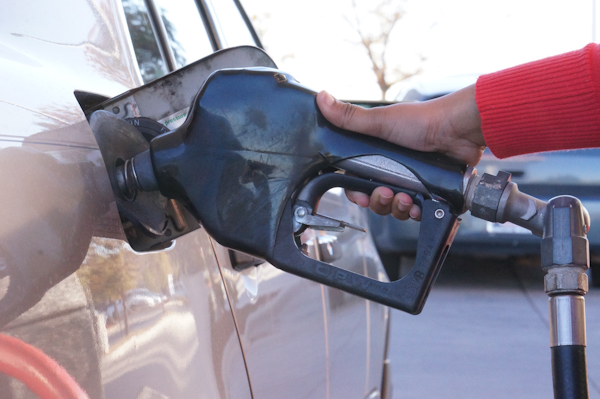Photo by: Henoc Kivuye
It is hard to imagine that gas used to be 30 cents per gallon, and has now increased to over $4 in some places. In the state of Oklahoma however, gas prices have taken a sharp turn downhill.
KTUL – the ABC affiliate in Tulsa, Okla.– reported Tulsa recently had the lowest gas prices in the nation.
“The prices of gas are decreasing for several reasons,” Jeff Simmons, associate professor of business, said. “The price of gas that we see is based on the laws of supply and demand just like in any economic situation with any product gas. Especially with oil being a commodity, the price of that gas depends on the price of the raw material which goes into it, like crude oil.”
The reason why Oklahoma has lower gas prices compared to other states is because of taxes the state puts on the gas. According to the Gasoline Tax Rates for the years 2009-2013, Oklahoma takes 17 cents on the dollar for taxes, while New York had a 50-cent tax on the dollar for gas. The least expensive was Alaska with eight cents on the dollar.
“The percentage energy consumption is going down globally, not just in Oklahoma,” Jody Jones, associate professor of business, said. “Natural gas, solar and wind power are becoming more popular. This week the European Central Bank cut interest rates, and when they cut interest rates the dollar gets stronger, which makes the price of oil go down and thus cheaper.”
Some states also increase gas tax for different purposes. Other states use the taxes gained from gasoline to fix roads or fund various programs.
“Some states use gasoline as a way to fund education,” Jones said. “The difference between Oklahoma and California for an example is the taxes placed on the gasoline itself.”
The United States has its own oil refineries and the global oil market industry plays a major part in influencing the price of oil not only overseas, but in the United States as well. According to Simmons, the United States is not dependent on oil from the Middle East. About 30 percent of oil is imported from abroad to the United States.
“The oil market is heavily influenced by the stability of regions that produce oil,” Simmons said. “The global market is the Middle East. Saudi Arabia is the world’s leading oil producer and another big player is Iran.”
Gas prices have decreased because of stability in the Middle East.
“If we see more stability in the Middle East, which we are seeing right now, then maybe the supply won’t be as much as it was currently,” Simmons said. “We are seeing stabilization in the Middle East, so the expectation is that people don’t have to pay nearly as much for oil because there is plenty of it.”
During the summertime, gas prices go up because more people are traveling, which increases the demand for oil.
“During the summer I rode my bike and my skateboard a lot to save gas,” junior Hilda Paden said. “Whenever I was doing stuff in town close to the school I would ride my bike so I was not wasting a lot of gas.”
This week, Jones paid as low as $2.76 per gallon, the lowest he has paid for gas all year. Simmons said his family typically spends $20 per week on gas.
“We typically try to save gas regardless of the price,” Simmons said. “We try to combine trips. We just won’t run to the store and come back; if we know we are going out then that’s when we go to the store because we are trying to save gas.”
Paden witnessed the decline of gas prices when she went to the pump not too long ago.
“I filled my tank up [recently],” Paden said. “Usually it takes about $40-45 to fill up my tank, but this time I put about $35. I was really surprised because I had not been paying attention to the gas prices and I liked that surprise.”
Although winter months disrupt driving, Jones warned that heating oil, which is used to warm homes, could still go up.
“People don’t drive as much in winter as they do in the summer,” Jones said. “However, you have to heat your house, which causes the heating oil to go up. You can do other things with oil besides make gasoline.”
Already, Paden has pessimistic views about next summer’s gas prices shooting up.
“I think gas prices will be back up in the summer of 2014 because people travel more during the summer, because people want to make money and the people selling the gas will bump it up,” Paden said.














Be First to Comment